- Home
- Raymond Benson
Doubleshot
Doubleshot Read online
Doubleshot
Raymond Benson
In a plot for revenge, an intricately organized crime group makes James Bond, 007, believe he is going mad. The only way Bond can regain his sanity is to embark on a personal mission that will lead him to the ultimate face-to-face confrontation--with himself.
Doubleshot
By Raymond Benson
Ian Fleming Publications
For Randi
PROLOGUE
PASEO
ONE
DRAMATIS PERSONAE
THE CONVENT’S SECURITY OFFICER GASPED WHEN HE SAW WHAT CAME UP on the computer screen. Domingo Espada’s British bodyguard had given his name as “PeterWoodward,” but he was positively identified as James Bond, agent 007 of SIS.
“Better have a look at this, sir,” he said to the aide-de-camp, a tall young captain from the Gibraltar Regiment.
The captain looked over the officer’s shoulder at the monitor and recognized the face—it was indeed the man who had walked into the Governor’s Residence that morning with Espada and the rest of his Spanish entourage. He was now upstairs with the other delegates, politicians, and their aides.
“I’d say he has a lot of nerve coming here like this,” the captain said. “He knows we can’t arrest him because he’s here with diplomatic immunity. I had better get on to London and let them know about it. You’re sure he passed through the metal detectors all right?”
“Yes, sir.”
The aide-de-camp frowned. “I don’t like it. The man’s a menace.‘Peter Woodward’ indeed. How long before the Governor and the PM arrive?”
Another officer was just hanging up a telephone. “The PM’s plane just landed. I would say half an hour.”
The Convent, the Governor of Gibraltar’s official residence on Main Street for over 250 years, was a hive of activity. As they were under a “Red” security alert, it was crawling with extra men from the Gibraltar Regiment. VIPs from several neighboring countries were upstairs, awaiting an important summit meeting between Britain’s Prime Minister, Spain’s Prime Minister, and others who had an interest in the Gibraltar conflict.
Another security officer rushed to the captain with a piece of paper. “This urgent fax just came in, sir.”
The captain read it. It was from the Ministry of Defence headquarters in London.
“My God” was all he could manage to say after he had absorbed the message.
Upstairs, Nadir Yassasin looked across the long table in the Banqueting Hall at the man the aide-de-camp was worried about. The man was the British secret agent, wanted by his own people, suspected of having turned terrorist, and one of the most dangerous men on the planet. There was no mistaking the face—from the three-inch scar showing whitely down the sunburned skin of his right cheek to the black hair, parted on the left and carelessly brushed so that a thick comma fell down over the right eyebrow. The gray-blue eyes were set wide and level under straight, rather long black brows. His jaw was firm and strong. His mouth was wide and finely drawn; Espada’s aide, Margareta Piel, had been correct in describing it as “somewhat cruel.”
Yassasin took a deep breath and congratulated himself for having finally arrived at this fateful moment. It had not been easy, but the project would surely go down as his finest hour. Everything had fallen into place, and he was confident that his new assassin would come through and perform his final task without hesitation. The man was already a cold-blooded killer. After undergoing the necessary “remodeling” and reconditioning, the Brit was now under Yassasin’s total control. The fool would do anything for him.
Yassasin almost allowed himself a smile. It was all going to happen in a few minutes, and agent 007 would take the blame. History would be made today, and Nadir Yassasin, the Union’s most accomplished strategist, would have a part in it. Yet, if all went according to plan, no one would ever know that he had even been in the room. Today, he was “Said Arif,” a Moroccan representative from a United States agency. He would leave the Rock under the same alias. It was sad, Yassasin thought, not to be remembered as he deserved for his role in the day that Gibraltar was besieged.
Never mind, he thought. His reward was that he had planned the entire operation, and that it was going to succeed.
Jimmy Powers glanced for the fifth time at the Gibraltar Chronicle sitting on the table beside him. The headline screamed, “PM TO MEET ESPADA TODAY,” beneath which was a picture of the Spaniard, standing at a podium with a painting of Franco behind him. His fist was raised and he was shouting to the throngs of people who would do anything he ordered. He certainly had something of Franco in him—not to mention the deadly charisma of a Hitler or a Mussolini. Another story on the front page announced, “Spanish Mob Gather at Border—UN to Mediate.”
“Gather” … that was funny, Powers thought. “Ready to erupt” would be more accurate. There were a couple of thousand men, armed and dangerous, waiting for the signal to storm across the border between Spain and Gibraltar. The Gibraltar Regiment and the Gibraltar Services Police had lined up a battery of weapons and were more than willing and ready to take them on—but this was a question of numbers, not strength. With the reinforcements from the U.K.delayed, the “Rock” didn’t have a chance. They had underestimated the power that Domingo Espada held over his people. More important, they also had no idea that the Union was behind the brilliant plan that would topple the British colony and make them look foolish. This was one time that history would not repeat itself. The most impenetrable fortress in the world was about to be assailed—from the inside.
Powers moved his right hand surreptitiously to his waistband and felt the Browning 9mm, waiting for the fateful moment when it would be called into play. According to the plan, he was not supposed to do anything unless something went wrong. If all went according to plan, then he would walk out of the Convent alive. If not, well … he would die killing as many people in the room as he could.
No one could detect the Spanish 9mm Super Star inside Margareta Piel’s jacket pocket, for she was unusually adept at moving with grace and poise. After all, she was one of the most accomplished equestrians in Spain.
Margareta took stock of the room and what was about to happen in it. She was beginning to have doubts about the Union’s choice of an assassin. If her suspicions were correct, then the entire operation was blown. She would have to do what she could to save her own skin and get out of the room alive.
Margareta scanned the others’ faces and carefully considered who might be a threat when the shooting began. The Spanish Prime Minister and the other politicians from the U.K., America, Gibraltar, and other U.N. representatives posed no danger. The only additional woman in the room was an Arab, dressed traditionally in a caftan and a veil, which hid her face entirely except for a shadowy slit for her eyes. Margareta was confident that she wouldn’t be any trouble either.
Margareta had to admire Espada, who at sixty-two looked more like fifty. He had made a fortune and won the hearts of the people during a three-decade bullfighting career. Now a businessman and politician, Espada was a staunch supporter of those who repeatedly called for Gibraltar, that “pebble in Spain’s shoe,” to be ceded back to his country. He hated the British. He had used his considerable power and influence in the Costa del Sol region of Andalucía to bring about what history would someday call a revolution. The government in Madrid didn’t like it, but there was not much they could do because of his popularity. Many of his followers called him El Padrino—“Godfather.” This was appropriate, for Domingo Espada was perhaps the most efficacious racketeer in the Mediterranean area.
Margareta turned her attention once again to the killer next to her. Her lover. The incongruous Brit, sitting among the group of Spaniards at the table. He certainly had become a d
ifferent man in the last three months. She studied his features, the broad shoulders, and his unbelievably relaxed demeanor.… The name “James Bond” fitted him nicely. It was blunt and masculine, just as he was.
But things were not as they seemed. What should she do? She had to speak to the assassin.
The gun was warm in the pocket near her breast. She squeezed her legs tightly, forcing waves of pleasure to jolt up through her spine and into her brain. The sudden stimulation brought her focus back to the task at hand.
She patted the warm metal in her pocket once more for inspiration, then prepared to make her move.
For his part, Domingo Espada looked upon the day’s political meeting as a formality that must be suffered before the day’s real business could begin.
So far everything had gone smoothly. The British PM and Governor were on the way. This would be a day long remembered in Spain’s history. Screw the politicians in Madrid, he thought. Espada was satisfied that they were, quite simply, afraid of him. He had single-handedly amassed more support and power from the lower and middle classes than any other Spaniard in the twentieth century except Franco. It was only fitting that the millennium launch a new era of Spanish dominance in the Mediterranean.
Domingo Espada was quite prepared to die for his cause. Even if the plan failed, he would be happy to go down in history as the instigator of the Great Siege of the Millennium.
Today, Gibraltar. Tomorrow … ?
The man who had been identified by the Convent’s security apparatus as James Bond was ready for the assignment at hand. He mentally checked his body to make sure that the Walther PPK was in place in his waistband. He was now itching to get the act over and done with.
For the hundredth time, the hired Union assassin went over the details of the plan. When the PM entered the room, the killer was first to take out the Double-O agent serving as the PM’s bodyguard and then the Governor’s bodyguard. The next target was the PM himself, who would die with a single bullet to the head. Before anyone else had time to react, the Governor of Gibraltar would be shot. By then, Espada, Agustin, and the woman would have sprung into action. They would draw their own weapons, kill any guards who might be in the room, and then hold the rest of the delegates hostage. The Spanish prime minister would be executed if he didn’t agree to Espada’s demands. Yassasin and Powers were to use their weapons only if something went wrong. Otherwise they would maintain their covers as diplomats, become “hostages,” and eventually be released. Espada would declare himself the new Governor of Gibraltar, and the signal would go out for his men to storm the border and take over the colony.
It seemed easy enough. He knew he could handle it.
Finally, the door opened and the aide-de-camp stepped into the room. “The car has just arrived,” he announced. “The prime minister and His Excellency are just entering the Convent now. They should be here any moment.”
It was time. The Union members in the room shared a quick knowing glance as the captain stepped out and closed the door.
The man identified as James Bond gripped the gun at his waist and waited for the door to open again.
ACT ONE
TERCIO DE VARAS
TWO
SUICIDE MISSION
AS THE SUN HAD RISEN OVER NORTH AFRICA TWO WEEKS EARLIER, THE plaintive morning call to prayer had floated out over the rooftops of Casablanca. Mixing verses from the Koran and a traditional beckoning for religious Muslims to offer the first of five obligatory prayers to be performed each day, the melancholy voice was one of the few things that the people of Morocco’s largest city could count on. While the new king and the government did their best to keep the population content, the country was suffering from vast unemployment and, as a result, crime. This was especially true in the larger cities such as Casablanca, Rabat, and Tangier. Casablanca, far from being the exotic and romantic locale for the famed Humphrey Bogart film, exhibited an odd conflict of traditional Moroccan culture with the trappings of a modern, metropolitan business center. The latter was winning, even though the city’s poor and needy were evident on every corner. Wherever there was money to be made in the face of outright poverty, a criminal element naturally gestated.
Even so, the awe-inspiring Hassan II Mosque, towering over the city like a benevolent sentinel, served to remind the people that Morocco was well ahead of its Muslim neighbors in terms of economic stability and that all was right with the world. In a way, the mosque represented a blending of the modern Muslim world’s idealism and its desire to exist on an equal basis alongside the West.
The ambitious leader of an organization that held its meetings not far away from the great monument shared this view.
As the religious faithful hurried to mosques and those who held honest jobs commuted to their places of employment before the early morning rush of business, the worst of Casablanca’s criminal element were also preparing for the new day. Several very different businessmen and women gathered to begin their day’s work in a hightech conference room decorated in reflective sheet metal. It was not an ordinary meeting room in that it was located two hundred feet below street level, beneath the old Central Market, which ran the length of a city block along Rue Allal ben Abdallah. The room was part of an immense, private, underground complex that extended northwest nearly a mile from the Market to the old medina, the centuries-old section of town that consisted of narrow, winding passageways where shopkeepers sold produce, arts and crafts, clothing, and souvenirs.
The complex had been built in the mid-nineties by a consortium represented by a powerful Arabic law firm. As most of the construction was below ground, very few Casablancans knew of its existence. In fact, the only two entrances to the complex were well hidden behind seemingly innocent stalls in the market and medina. A loading lift was also located in the market behind what appeared to be a rubbish skip. Much of the vast structure was empty. Workers inhabited perhaps a fifth of it, while supplies and weapons occupied another fifth.
The consortium that owned the property was made up of three banking firms—one located in Morocco, another in Switzerland, and one in Monaco. An offshore oil corporation with assets all over the Mediterranean and in North Africa was also a major shareholder in the property. Silent partners based in the Middle East and France were involved. Mostly, though, the funding came from a private individual who was now calling a meeting to order in the darkened, chilly steel chamber that was the conference room for the international criminal organization known as the Union.
“Are we all here?” Le Gérant asked.
The others casually spoke in the affirmative. As usual, Le Gérant was sitting in shadow, wearing dark glasses. Today he wore an Armani suit that fitted snugly over his rather large frame. This meant that today’s meeting would be strictly business. Le Gérant would stick to a memorized agenda, keep things moving along briskly, and discuss the all-important money issues.
Sometimes he wore a traditional jellaba, a gownlike garment with a hood. Although no one could pinpoint exactly why, the meetings were always different when Le Gérant dressed in Moroccan clothing. His considerable charismatic powers were somehow more intense when he embraced his mother’s ancestral Berber culture. Those in his presence felt an elusive aura of self-confidence and enlightenment, and this had a significant effect on his powers of persuasion and leadership. Meetings became lessons in philosophy or Union ideology, and money was never discussed. One commandant had said that Le Gérant became more “mystical” when he wore the jellaba.
Le Gérant never used or took notes. Everything was in his head. Always. He pulled sophisticated facts and figures from the air. He never needed to be reminded of anything. Anyone who had the privilege of meeting him always came away impressed by his profound intellect.
He was usually fair and generous with the Union’s profits. The other people in the room, the cercle fermé, were all millionaires thanks to their work for the Union. Each man or woman was a commandant responsible for a geographical area somewh
ere in the world, and employed anywhere from fifty to several hundred people, depending on the needs of the district. It took a lot of money to keep several hundred people happy and the Union was able to provide stability. That kept the commandants loyal.
Fear was also a major factor in keeping the cercle fermé faithful to Le Gérant. If for any reason he believed that someone had cheated him or attempted to do something behind his back, he became furious. He could extract a confession easily and punishment was, as a matter of course, swift and merciless. Commandant Jimmy Powers had seen a man’s throat cut in this very room.
The twenty-six commandants were required to take notes and be prepared with any documentation Le Gérant might require. Their leader was very strict, even compulsive, about the appearance of everything. He insisted on cleanliness and order. He dictated what kind of pens and paper would be used in the conference room, and what coffee was served and in which cups. He liked everything to be in its place. A desk light was essential at every station at the table, because Le Gérant kept the room so dark. The commandants, although they were used to them, never liked these policies and wished Le Gérant would change them. Why should they matter to him?
After all, Le Gérant was blind.
A servant entered the room with a tray full of tall glasses filled with hot mint tea. A Moroccan tradition, the tea was served with mint leaves floating in the narrow glass, and each person had the option of adding sugar or not. It was yet another part of the ritual Le Gérant insisted upon.
Jimmy Powers disliked mint tea intensely. It was something he put up with, though, for he had to admit that the Union had brought him more wealth and interesting things to do than the founding Union boss, Taylor Harris, could ever have hoped to offer. He had been wise to stick with Le Gérant after Harris was killed in Oregon. The original Union broke up after that, but Le Gérant’s reformed Union rose from the ashes. While the original Union made a show of being an organization of mercenaries willing to perform any paramilitary task for the right price, Le Gérant transformed the group into something far more serious. Once Le Gérant had outlined what the new Union could do for him, Jimmy Powers turned coat as well and left America for Morocco. He had been there for three years, acting as one of Le Gérant’s most trusted commandants.

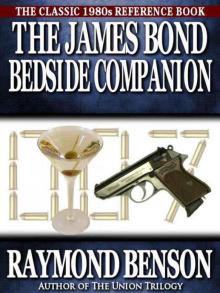 The James Bond Bedside Companion
The James Bond Bedside Companion The Black Stiletto's Autograph
The Black Stiletto's Autograph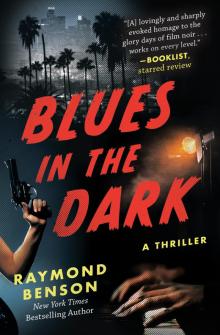 Blues in the Dark
Blues in the Dark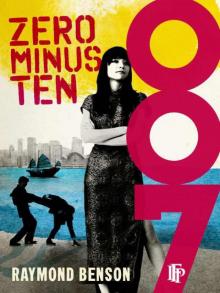 Zero Minus Ten
Zero Minus Ten The Black Stiletto
The Black Stiletto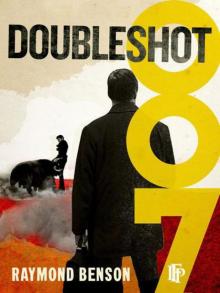 Doubleshot
Doubleshot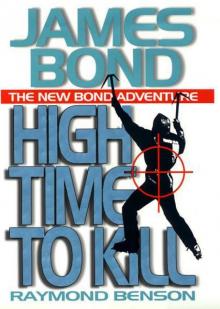 High Time To Kill rbb-3
High Time To Kill rbb-3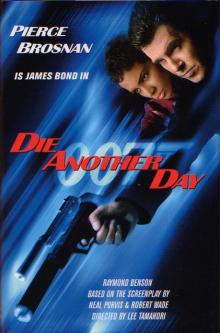 Bond Movies 07 - Die Another Day
Bond Movies 07 - Die Another Day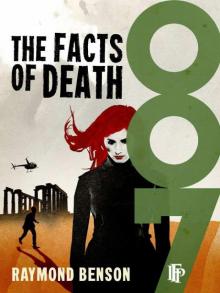 The Facts Of Death
The Facts Of Death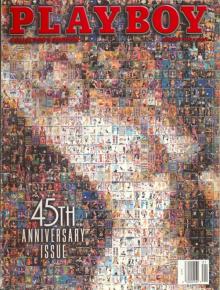 Midsummer Night's Doom
Midsummer Night's Doom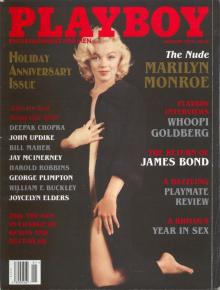 Blast from the Past
Blast from the Past The Secrets on Chicory Lane
The Secrets on Chicory Lane High Time To Kill
High Time To Kill The Black Stiletto: Black & White
The Black Stiletto: Black & White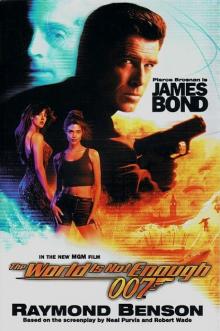 The World Is Not Enough jb-1
The World Is Not Enough jb-1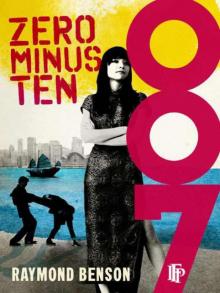 Zero Minus Ten rbb-1
Zero Minus Ten rbb-1 In the Hush of the Night
In the Hush of the Night The Black Stiletto: Stars & Stripes
The Black Stiletto: Stars & Stripes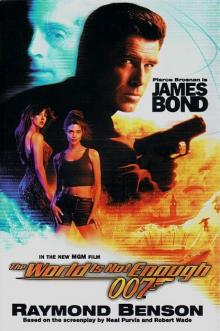 Bond Movies 06 - The World Is Not Enough
Bond Movies 06 - The World Is Not Enough The Rock 'n Roll Detective's Greatest Hits - A Spike Berenger Anthology
The Rock 'n Roll Detective's Greatest Hits - A Spike Berenger Anthology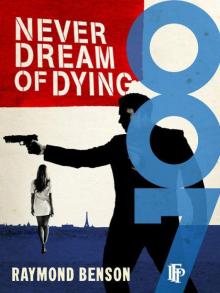 Never Dream Of Dying
Never Dream Of Dying